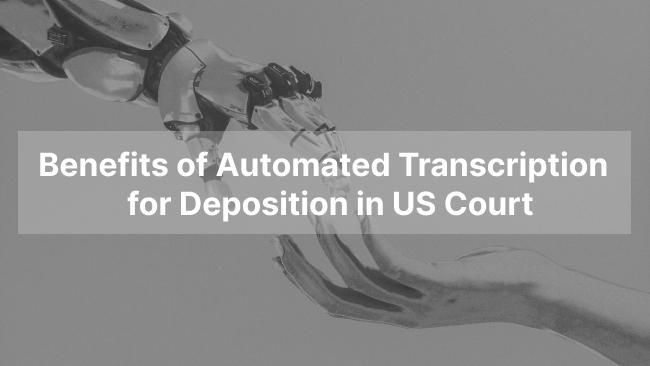Legal Transcription vs. Dictation: Which is Right for You?
December 2022
·
4 min read

Working as a legal professional is challenging, no matter what field of law you specialize in. You need to be able to research legal terminologies and existing cases to build a compelling case for a trial.
In the legal field, even the slightest misinterpretation or misrepresentation of information can have severe consequences, leading to legal disputes or even legal malpractice lawsuits.
The need to exchange accurate information needs precise note-taking. Legal transcription services and dictation are two helpful processes for that purpose.
Dictation and legal transcription services are similar, but they're not the same.
What is Dictation?
Dictation is the process of verbally recording or writing down spoken words by either human or an automated AI software rolling out the live transcription for you.
Lawyers, judges, or other legal professionals create written documents such as legal briefs, or contracts with the help of dictated audio or written transcription. It is a convenient and efficient way to create written records in the legal field.
What is Legal Transcription?
Transcription is the conversion of recorded speech into text, which are generally pre-recorded. It can either be an instant AI legal transcription or human transcribed using a keyboard.
Legal Transcription vs. Dictation
Depending on your need, one method may be better suited than the other. So consider the one that best fits your schedule and makes your task easier when deciding between the two.
⏱️ Time Taken
The time taken for dictation and transcription varies depending on several factors such as :
-
The length and complexity of the audio being recorded
-
The quality of the audio recording
-
The experience and skill of the person doing the dictation or transcription
Dictation is generally faster than transcription as the person performing the dictation speaks in real-time, and it’s converted into text form in real-time.
Unlike legal transcription, dictation happens almost instantly. If you’re a legal professional who wants the information immediately, dictation may be the most practical option.
The speed of dictation also depends on the speaker's pace, clarity of speech, and the number of pauses or corrections required.
Transcription can be a time-consuming process, especially if the audio quality is poor or the recording includes multiple speakers and technical jargon.
Depending on the length of the recording, it can take several hours or even days to transcribe accurately if you opt for human transcription.
Whereas, you can live-transcribe your legal documents with the help of AI if you are working under a time constraint and have a low budget. AI-generated transcription however can sometimes misspell certain words due to poor audio quality or multiple speakers.
So, in a case where time is of the essence, dictation is the way to go. However, transcription provides easy-to-understand and qualitative content out of those two.
🧑💼 Human vs AI 🤖
In the past, dictation primarily involved a secretary writing the conversation in shorthand before preparing a full version. Nowadays, it involves software that automatically writes and records speech before saving it as a text file.
The quality of recording can vary depending on various factors like the use of equipment and type of software.
On the contrary, transcription normally involves a human typing up the recording and editing necessary changes whilst removing filler words and unnecessary sound effects if required.
The content of a transcript can include as much or as little information as you want, such as timestamps and speaker labels.
This adds a human element that is difficult, if not impossible, to get with modern dictation.
Due to human intervention, transcription is a lot more accurate and human-like than dictation.
🖇️ Ease of Sharing
Both dictations and transcriptions can be easily shared with others. Dictations are shared as audio files with the relevant stakeholders.
Going through an entire audio file to find a specific quote can be taxing. However, transcriptions are shareable, and since they're in textual format you can even copy-paste and share only parts of the relevant transcript.
It is also easier to skim through, search, and highlight a quote, or statement in a transcript than in an audio file. You can also cut and create a separate reel of your transcription files. ons are shareable, and since they're in textual format. You can even copy-paste and share only parts of the relevant transcript. It is also easier to skim through, search and highlight information in a transcript than in an audio file.
🗣️ Clarity
When recorded in noisy surroundings or having faulty equipment for recording can lead you to experience problems with the quality of the tape afterward with dictation.
You need to ensure that your audio recording is as clear as possible for the software to document it accurately.
On the other hand, a skilled transcriptionist pays enough attention to the content and leaves out filler words that make little or no sense. Generally, dictation software cannot reproduce the human element of transcription.
Redaction is very common in the legal field. The Federal Rules of Civil Procedure Rule 5.2(a) protects this confidentiality and requires attorneys to redact client’s sensitive personal information.
Since transcription involves human intervention, you can redact parts that contain the personally identifiable identity (PII) of your clients.
Transcriptionists can deliberately exclude unnecessary sounds and are more likely to identify the correct words that best suit the context.
Final Thoughts
Legal practitioners in any field of law can get a lot out of both dictation and legal transcription. The better choice for you depends on what your need is. Consider the factors above before choosing the right service.
Learn more about how Reduct can help you with legal transcription and other legal needs.

